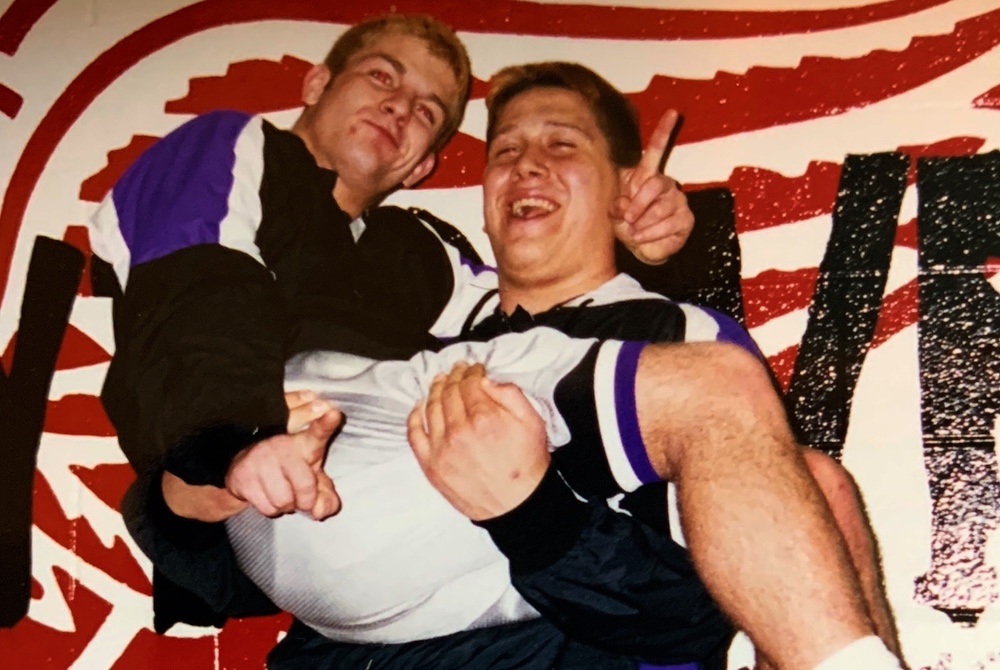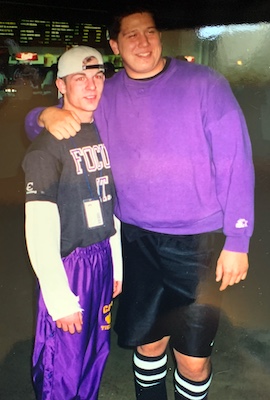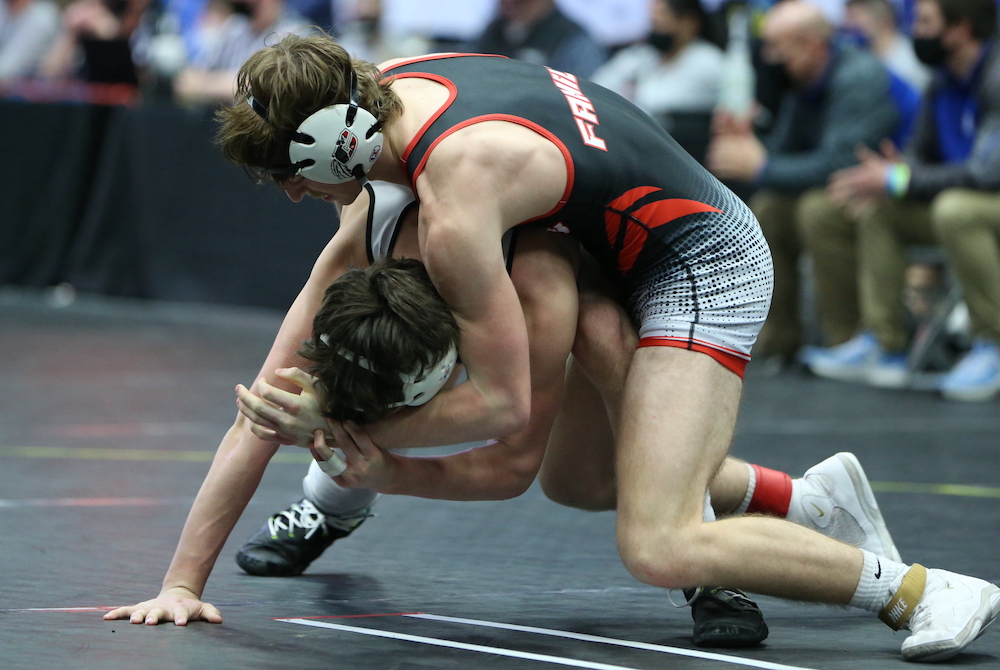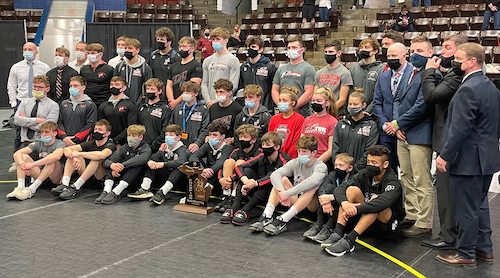
Caro Champs Find Common Ground Again as Mental Health Providers
By
Paul Costanzo
Special for MHSAA.com
July 8, 2021
Phil Millerov and Phil Niklowicz wanted to do more than simply defeat opponents when wrestling at Caro High School.
They wanted to dominate – physically and mentally.
 “We had this thing between us where we wanted to be done, and (opponents) didn’t want to come back on the mat with us,” Millerov said.
“We had this thing between us where we wanted to be done, and (opponents) didn’t want to come back on the mat with us,” Millerov said.
Twenty years later, both spend their days building people up. Millerov is a licensed professional counselor, while Niklowicz is a licensed therapist.
“I went out there looking to dominate and make sure it was known that I am the superior wrestler in all facets,” Niklowicz said. “I would try to run up as many points as fast as I can. I would teach the same thing when coaching, specifically with my nephew. You’re saying, ‘Listen, we want to break these people.’ Then the next day, in a therapy session, it’s like, ‘Let’s build up your self-esteem and set some goals to boost ourselves up.’”
The close friends and two faces of Caro’s surging wrestling program in the late 1990s now have very similar careers. Millerov – who finished second, third and first at 275 pounds in the 1998, 1999 and 2000 MHSAA Finals, respectively -- works in private practice at Transitions Counseling Service in Greenville, where he specializes in substance abuse disorders. He also has served as a Class 1 Fellow at the WK Kellogg Foundation.
Niklowicz – a two-time MHSAA Finals champion (1999 and 2000) and four-time placer – is working in private practice in Southfield, seeing mostly children. He also works in adult foster care with patients who have had traumatic brain injuries.
“He and I went and hiked Pictured Rocks at the beginning of May,” Millerov said. “And we joked about how nobody would have guessed that we’d be doing this now.”
That Millerov and Niklowicz are still close does not come as a surprise. Their friendship began when their wrestling careers did, as 6-year-olds in the Caro Growlers program. As they were becoming two of the state’s top wrestlers, they would share rides to tournaments, and their families grew close.
In high school, despite their size difference – Niklowicz wrestled at 135 his senior year – it wasn’t uncommon to see them warming up together.
“We were definitely easy going and liked to mess around a lot,” Niklowicz said. “We used to mess around before meets and throw each other. He would jump and I would throw him. People would look at us like, ‘Why is that little guy throwing that big guy?’”
 While their teams never made it out of the Regional, Millerov and Niklowicz helped set the stage for a program that would become among the best in Division 3 throughout the 2000s, qualifying for five straight Quarterfinals from 2003-07 and winning the Division 3 Finals title in 2003.
While their teams never made it out of the Regional, Millerov and Niklowicz helped set the stage for a program that would become among the best in Division 3 throughout the 2000s, qualifying for five straight Quarterfinals from 2003-07 and winning the Division 3 Finals title in 2003.
Individually, they were among the most well-known and feared wrestlers in the state.
“Niklowicz and I were fortunate to have each other, because we pushed each other,” Millerov said. “We were in constant competition with each other and ourselves. Just to kind of push each other, it was a great thing.”
Niklowicz finished fifth as a freshman and third as a sophomore before winning back-to-back titles to close out his career. In 1999, he defeated Nick Oertel of Goodrich 9-2 in the 125-pound final, and the next year he defeated Oertel’s teammate, Ryan Tripp, 7-5 at 135. Tripp would go on to win an individual title the following year. Niklowicz would finish his career with 214 victories.
“I think probably both (Finals titles) were equal,” Niklowicz said. “I think there was probably a little more stress going into my senior year. My motivation always came from improving, then it was maintaining the state title. You don’t want to go the opposite direction.”
Millerov lost a tight 6-4 decision against Remus Chippewa Hills’ Bob Kozlowski in the MHSAA Finals as a sophomore, and had an epic 12-10 match against future NFL defensive lineman Jason Babin of Paw Paw in the 1999 semifinals before fighting back to take third. The next year, he won his title via first-period pin against Dan Kliphuis, a two-time runner-up from Grand Rapids West Catholic. Millerov finished with 196 career wins and set the state record for pins in a career (160), which was broken the next season by Nick Simmons of Williamston and is now held by Justin Zeerip of Hesperia. The 56 pins Millerov recorded his senior season remains second all-time to Simmons, who had two seasons with 57.
“I never really thought about (the pin record) to be quite honest,” Millerov said. “It was just kind of in the background. It didn’t matter; all I cared about was winning this match, and I wanted to do it in the most effective, efficient way I could.”
They both continued their wrestling careers, but went their separate ways in college, with Millerov heading to Neosho County Community College in Kansas and Niklowicz to Virginia Tech.
Millerov had interest from several Division I schools coming out of high school, including some in the Big Ten, but he admits his grades weren’t good enough at the time. Neosho provided a chance to compete with some of the best in the country while at the junior college level, however, as the team took second at the National Junior College Athletic Association championships in 2002.
He transferred to Central Michigan after his sophomore year, joining his girlfriend – now his wife – who was already attending, and walking onto the wrestling team. While his relationship lasted, wrestling did not.
“I was distracted,” Millerov said. “My grandmother passed away in 2002 in that summer. I was trying to get that motivation back, and I just lost it. There has to be that edge with wrestling. When things didn’t work out, I struggled. Wrestling was my identity.”
Millerov was working to follow in his father’s footsteps and become a police officer. But the elder Phil Millerov, who died in 2012, talked his son out of it.
“Looking back on it, for me, it was obviously the right decision,” Millerov said.
The idea to go into counseling came after Millerov was married in 2006, as his wife had gotten into the program. He went back to school to earn his bachelor’s degree from CMU in 2007, and would go on to get his master’s from CMU, as well.
“I had taken a bunch of psychology courses just because I liked the field,” Millerov said. “I liked to be challenged. I liked puzzles, and with psychology, it’s like a new puzzle every hour. It just clicked. I flew through and graduated with like a 3.8. I was like, ‘Wow, I kind of feel smart.’ It was good to find something I was passionate about again.”
Millerov said he’s constantly learning and honing his craft, much like he did as a wrestler. A major difference now, however, is that he’s found more balance in his life.
“I think about working with athletes in addiction, I find a lot of similarities,” he said. “Wrestling was my life, it’s how I identified myself. I hear that same kind of talk around people struggling with addiction. One you’re considered successful for, the other you’re not. Most of my growth has been around finding balance. I find that my happiness and my clients’ as well, is when we found that balance instead of being good at just one thing. I want you to have passion, I want you to do things you love, but I also want you to be effective as a husband, a father, whatever other responsibilities you have.”
 Niklowicz’s journey to becoming a therapist was more telegraphed, as both of his parents work in mental health, and he said it was always something he wanted to do, as well.
Niklowicz’s journey to becoming a therapist was more telegraphed, as both of his parents work in mental health, and he said it was always something he wanted to do, as well.
He attended Virginia Tech on a wrestling scholarship, but transferred to Eastern Michigan after one year. The Hokies had recruited him to wrestle at 133 pounds, but when the team’s 125-pounder was injured, Niklowicz was asked to cut down further. Like Millerov, he struggled when his wrestling career ended.
“I just had a really bad taste in my mouth after leaving Virginia Tech and trying to cut all this weight,” he said. “Some of it was I had lost the desire to work out, to wrestle. Fifteen years, roughly, of my life was dedicated to wrestling, and once you stop, what do I do with my winters? What do I do with seven months of the year? It was definitely a part of my identity; that’s why I got into coaching. I did MMA fighting for a little bit to have something competitive.”
Like Millerov, Niklowicz said finding balance was important.
“In the mental health field, specifically, there’s a lot of burnout for people,” he said. “Every day, you’re listening to people talking about their problems, but at the same time, they’re coming for a reason and they’re there for help, so you have to provide that help and have to motivate yourself to come to the office every day and give it your best. I try to instill the motivation that I used to other people.”
When Niklowicz looks at his time as an athlete compared to his work as a therapist, he said that work ethic is the main characteristic that has carried over.
“I think my practice mentality was the same as it was on the mat,” he said. “Even in the wrestling room, these are people I’m friends with, people I grew up with, and I still didn’t want anyone to score on me. Then you just look at your work ethic outside of wrestling, whether you’re studying for exams or motivating yourself to get up and go to class.”
While they are no longer living in the same town or living similar lives – Millerov is married with three kids, while Niklowicz is single – the connection between Caro’s dominant duo remains strong, both professionally and personally.
“I don’t think we ever thought we would be going down such a similar path, and I doubt that either one of us grew up thinking we would do the exact same thing,” Niklowicz said. “We met when we were 6 years old, and we’ve been best friends forever. I think it’s hilarious that we’ve taken such similar paths but with some glaring differences. It’s definitely interesting that we’re still really good friends after 30-some years, especially since we’ve moved on and gone our separate ways.”
2020-21 Made in Michigan
June 28: Michigan's Minor Leaguers Making Up for Lost Season - Read
PHOTOS: (Top) Caro’s Phil Millerov lifts teammate Phil Niklowicz as both celebrate Division 3 championships during the 2000 Individual Finals at Joe Louis Arena. (Middle) Niklowicz, left, and Millerov were high school warm-up partners despite wrestling at significantly different weights. (Below) Niklowicz and Millerov take a selfie during a hiking trip to Pictured Rocks National Lakeshore in May. (Photos courtesy of Niklowicz and Millerov.)

Repeat Reaffirms Clinton's Spot Among Annual Contenders
By
Paul Costanzo
Special for MHSAA.com
March 30, 2021
KALAMAZOO – The Clinton wrestling program took its place at the top of Division 4 a year ago, claiming the first Finals title in school history.
On Tuesday, it emphatically announced that it’s here to stay.
Clinton rolled through its competition throughout the day, topped off with a 55-9 win against New Lothrop at Wings Event Center, to claim its second-straight Division 4 title.
“I think now people know that we’re the real deal,” Clinton co-coach Jeff Rolland said. “We solidified what we did last year. We’ve got a lot of young kids – there's only four guys in our lineup every day that aren’t going to be here next year. We did this without three all-staters in our lineup from last year. We have a lot of depth. We have more coming. I think people know that we’re for real now. It’s not a one-year deal or whatever.”
Clinton was dominant throughout the postseason, and closed it out the same way, winning 76-6 in the Quarterfinal against Ravenna and 59-9 in the Semifinal against Leslie. That’s despite what Rolland said was a performance in the Semifinal that was less than the team’s best. But Clinton has reached the point where it can win even when it’s not at the top of its game.
“Since my freshman year we were chasing it and we fell short, then we fell short again my sophomore year,” senior Landis Gillman said. “My junior year we really picked it up, and we got into the mindset that we wanted it. We became a family. We’ve just been striving and pushing ourselves to the limits to reach this point.”
And in case there was any doubt remaining about the program’s status, Clinton has won its titles against the two programs that had dominated the division for more than a decade prior – Hudson (2020) and New Lothrop.
“Last year was big because we had to go through both,” Rolland said. “New Lothrop, if they’re not the most storied program in the state, I don’t know who is. We’ve got nothing but respect for that team, those guys. It makes it special when you beat a team like that, for sure.”
It was Gillman who started Clinton off with a bang in the Finals, as he bumped up to 140 pounds and won by major decision against New Lothrop’s Andrew Krupp in a matchup of wrestlers ranked in the top three.
Clinton won the first six matches of the dual, five by major decision – by Gillman, Kent McCombs (145), AJ Baxter (152), Spencer Konz (160) and Logan Badge (189) – and one with a first-period pin from Brayden Randolph (171).
“Landis had a day today,” Rolland said. “He went through some kids today. That was big. He’s up a weight class. He’s very, very good as you saw. But a major starting out, I think our kids fed off that. I’m so proud of that kid. He’s a senior, he spent two years on the bench, waited his turn, and now he’s got his shot.”
 New Lothrop picked up its two wins in the dual at 215 and 285, as Grayson Orr won a 4-3 decision, followed by a second-period fall from Isiah Pasik.
New Lothrop picked up its two wins in the dual at 215 and 285, as Grayson Orr won a 4-3 decision, followed by a second-period fall from Isiah Pasik.
Clinton closed the dual out with six straight wins, however, as Connor Younts (103) and Ethan Younts (135) each won by pin, Nik Shadley (125) won by technical fall, and Coy Perry (112) and Zak Shadley (130) won by decision. Connor Busz (119) won by forfeit.
“We did what we needed to do; we wrestled those kids hard,” New Lothrop coach Jeff Campbell said. “They sent a kid out at every weight that was a very talented wrestler, a very experienced wrestler who was well-coached, and we had to compete hard against them, and every single kid did. We just didn’t have as much ammunition as they did today. But I was really, really proud of our effort. We made plenty of mistakes, but we definitely made every point get earned, and that’s all we can try to do.”
The championship match appearance was the first since 2018 for the Hornets, who had made five straight starting in 2014 and have won 15 team titles.
“It’s an expectation – from the youth level up, we try to put ourselves in a position to do well,” Campbell said. “I think it’s great for our younger guys, and those younger guys that got to step onto the mat. It’s another one of those years when we lose a good crop of seniors. I told them out here, ‘You seniors, your legacy isn’t whether or not you win or lose this last match or you win or lose a state title yourself. It’s what did you teach the kids along the way? Even when you didn’t know they were watching, what were you doing? How hard were you working? Were you cutting weight the right way? Did you compete in these matches when you were the underdog fearless and wrestle hard?’ They showed that today.”
New Lothrop defeated Bark River-Harris 54-20 in the Quarterfinal, and received a bye in the Semifinal, as both Hudson and Schoolcraft were disqualified for putting in a wrestler at an ineligible weight in their Quarterfinal.
Gillman, McCombs, Baxter, Randolph, Badge, Connor Younts, Perry, Busz and Zak Shadley each picked up three wins on the day for Clinton.
PHOTOS: (Top) Clinton’s Landis Gillman wrestles New Lothrop’s Andrew Krupp during Tuesday’s Division 4 Final. (Middle) Clinton celebrates its repeat championship. (Click for more from HighSchoolSportsScene.com.)

